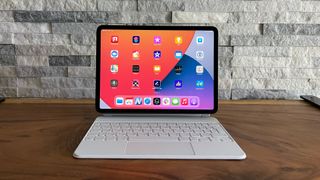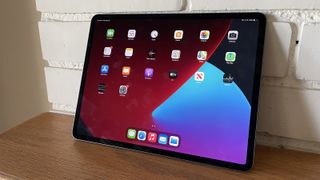We don't need a new iPad Pro in 2022
No more incremental updates

Pro gadgets are meant to be exciting, top-end products with flashy features and mind-bending specs, so it's a sad day when the suffix 'Pro' instead only inspires boredom or apathy.
That's the case with Apple's iPad Pro range, at least for this writer. While the first few generations of Apple's top-end tablet line were exciting, with huge screens, powerful processors, and accessories that made them portable workstation powerhouses, that's not enough anymore.
The iPad Pro (2020) and iPad Pro (2021) were both incremental upgrades over their predecessors, with barely any meaningful changes to inspire excitement in buyers, and that's why I don't think the iPad Pro (2022) should come along.
No, I think Apple should skip a year and wait for the iPad Pro (2023), so software can catch up and new technology can be introduced to make the device exciting.
What did you just say about the iPad Pro?

I don't think the last two generations of iPad Pro have been very exciting at all, despite the fact the newest one used Apple's super-powerful M1 chipset.
Why? Well, in a tablet, an M1 chipset and loads of processing power bring barely any advantages for average users.
Despite there being more power, there's still nothing to use that power on. The most power-intensive programs I've used, including editing apps like LumaFusion and games and streaming apps, work incredibly well on older tablets, making M1 redundant.
Get daily insight, inspiration and deals in your inbox
Sign up for breaking news, reviews, opinion, top tech deals, and more.
I still use LumaFusion on my iPad Pro 12.9 (2018) and it works quickly and easily - there's absolutely no reason to need an M1 chipset, even if it is more powerful.
That also applies for other changes like a LiDAR scanner on the back and 5G connectivity in certain 2021 iPad Pros. 5G networks are still so spread out and sporadic, and in some regions completely non-existent, that this innovation isn't too useful for tablets, and LiDAR is only useful to an incredibly small group of people, as it brings better depth-sensing than standard cameras.
One other headline feature was the mini LED screen, though this only came to the 12.9-inch version of the iPad Pro and not the 11-inch one. Honestly, the changes here are negligible unless you put the new slate alongside an older one - and even if it did reinvent display technology, a slightly different-looking screen isn't enough to sell a tablet anyway.
So despite these upgrades, the average users' experience with the iPad Pro hasn't changed over the last few years, and we need to wait for new apps that make the most of extra processing power, or a change in users' needs so that iPads become more vital.
Nothing new under the sun

Tech doesn't move quickly. Just look at foldable phones as an example: the first was launched in 2019, and three years later, they're still only for a select few, with only one company seriously working in the space.
Brand-new must-have innovations don't come about every year either, which is why the phrase 'incremental upgrades' is used so much in tech - companies have convinced themselves that they need to put out a new device each year, despite the fact that most years there's nothing new to add, resulting in minimal upgrades and boring phones.
Apple doesn't need to release a new iPhone each year, either. Samsung doesn't need a new Galaxy S family every 12 months, and it's the same for every other company too.
However this article isn't about the consumer tech industry's anti-consumer churn, wherein it pumps out similar products and tries to convince you there's something new about them in a desperate attempt to make money. No, it's about iPad Pros.
Just as with other devices, we don't need to see iPad Pros each year, and if Apple waited two or more years between updates, we might see new iPads that are bigger changes from their predecessors.
Since the iPad Pro line debuted in 2015, we've only seen one year skipped so far, which was 2019, and the 2020 model wasn't that different from the 2018 one anyway. But with three generations of basically the same device now (as the 2018 one was a genuine reinvention of the 2017 issue) Apple really needs a change.
That's doubly the case now that the iPad Air 4 and iPad mini (2021) are rapidly catching up to the iPad Pro line in terms of design and display, so the top-level family is losing its edge.
As a consumer tech website, which can write articles about the newest tech and encourage you to buy it, a new iPad Pro for 2022 is no big issue for us. But as a tech fan, I've got to say: "Apple, give it a rest".

Tom Bedford was deputy phones editor on TechRadar until late 2022, having worked his way up from staff writer. Though he specialized in phones and tablets, he also took on other tech like electric scooters, smartwatches, fitness, mobile gaming and more. He is based in London, UK and now works for the entertainment site What To Watch.
He graduated in American Literature and Creative Writing from the University of East Anglia. Prior to working on TechRadar, he freelanced in tech, gaming and entertainment, and also spent many years working as a mixologist.